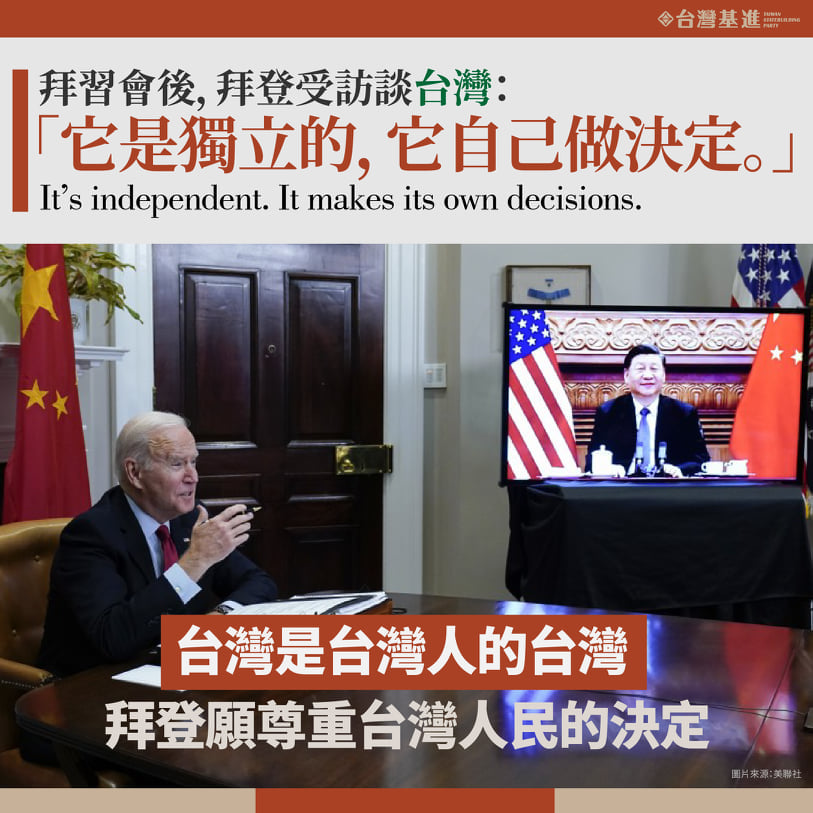比較正確的說法,應該是拜登「不支持美國為『台灣獨立』出兵打仗」

拜登在1979年《台灣關係法》通過時,就已經在國會,是重要的決策者之一。拜登在2001年特別來台灣,也到中國去解釋他的立場,也是當時美國民主黨的立場:
拜登:「透過《台灣關係法》,你們不再是一個獨立的國家,我們(美國)同意你們會成為中國的一部分,而你們(中國人)自己會解決。」
That act, he said, told Taiwan "you are no longer an independent country. You are no longer an independent nation-state. Weve agreed that you are going to be part of China and that you will work it out.“
所以不要試圖宣告獨立,我們不會為你宣布台灣獨立而戰爭
“So dont go declaring independence, because we are not willing to go to war over your unilateral declaration of independence."
"so we dont encourage reckless action on either side."
我們保留我們的權利來使用我們的武力,但是我們會看實際情況,看雙方(台灣和中國)的 行為來決定。過去已經有七任總統如此決策,未來也會持續如此。
"Depending on how each of the parties behaves," he said, "we reserve the right, as we do in every circumstance, to use American forces. ... It will depend upon the circumstances. Thats how its been for seven presidents. Thats how it should remain
已故的前民進黨立委蔡同榮,在2008年投書媒體,談他與拜登的交手經驗,當年他與FAPA大力推動《台灣安全加強法》,眾議院壓倒性通過後,送到參議院,卻遭到拜登強烈反對,終告胎死腹中。這個例子可以看出,拜登對台灣的不友善。
2001年5月
拜登投書《華盛頓郵報》
言辭精準很重要,在外交和法律中都是如此。
上週布什總統被問及如果台灣受到中國的攻擊,美國是否有義務保衛台灣。他回答說:「是的,我們明白,中國人必須明白這一點。是的,我會的。」
採訪者問道:「以美軍的全部力量?」
布什總統回答說,「不惜一切代價」幫助台灣自衛。
幾個小時後,總統似乎放棄了這一令人震驚的新承諾,強調他將繼續遵守過去五屆政府所遵循的「一個中國」政策。
美國曾經有「戰略模糊」政策——我們保留使用武力保衛台灣的權利,但對我們可能或可能不會干預台海戰爭的情況保持沉默——我們現在似乎有一個含糊不清的戰略模糊政策。這不算是進步。
Last week President Bush was asked if the United States had an obligation to defend Taiwan if it was attacked by China. He replied, "Yes, we do, and the Chinese must understand that. Yes, I would."
The interviewer asked, "With the full force of the American military?"
President Bush replied, "Whatever it took" to help Taiwan defend itself.
A few hours later, the president appeared to back off this startling new commitment, stressing that he would continue to abide by the "one China" policy followed by each of the past five administrations.
Where once the United States had a policy of "strategic ambiguity" -- under which we reserved the right to use force to defend Taiwan but kept mum about the circumstances in which we might, or might not, intervene in a war across the Taiwan Strait -- we now appear to have a policy of ambiguous strategic ambiguity. It is not an improvement.
美國在【幫助台灣維持其充滿活力的民主】方面具有重大利益。今天,我仍然像 22 年前投票支持《台灣關係法》一樣致力於維護台灣的自治,該法案規定美國有義務向台灣「提供使台灣保持足夠的自衛能力所必需的國防物品和國防服務......」我仍然堅持台灣的未來必須以和平方式決定的原則,符合台灣人民的願望。
美國的適當角色是什麼?總統的國家安全顧問上週三聲稱:『《台灣關係法》非常清楚地表明,美國有義務讓台灣的和平生活方式不被武力破壞』
不,不完全是。自從我們廢除了 1954 年由艾森豪威爾總統簽署並獲得參議院批准的《共同防禦條約》以來,【美國就沒有義務保衛台灣】。《台灣關係法》闡明,作為一項政策問題,任何以非和平方式決定台灣未來的企圖都將構成「對西太平洋地區和平與安全的威脅」,並美國必將嚴重關切
The United States has a vital interest in helping Taiwan sustain its vibrant democracy. I remain as committed today to preserving Taiwans autonomy as I was 22 years ago when I cast my vote in favor of the Taiwan Relations Act, which obligates the United States to provide Taiwan "with such defense articles and defense services . . . as may be necessary to enable Taiwan to maintain a sufficient self-defense capability." I remain committed to the principle that Taiwans future must be determined only by peaceful means, consistent with the wishes of the people of Taiwan.
What is the appropriate role for the United States? The presidents national security adviser last Wednesday claimed that "the Taiwan Relations Act makes very clear that the U.S. has an obligation that Taiwans peaceful way of life is not upset by force."
No. Not exactly. The United States has not been obligated to defend Taiwan since we abrogated the 1954 Mutual Defense Treaty signed by President Eisenhower and ratified by the Senate. The Taiwan Relations Act articulates, as a matter of policy, that any attempt to determine the future of Taiwan by other than peaceful means would constitute "a threat to the peace and security of the Western Pacific area" and would be, "of grave concern to the United States."
該法案(《台灣關係法》)規定總統有義務【在台灣安全受到威脅時】通知國會,並規定總統和國會應根據憲法程序確定美國的適當回應。
那麼,如果在“義務”和“政策”之間做出選擇,有什麼可大驚小怪的?
在外交上,保留【使用武力的權利】與【事先要求自己保衛台灣】之間存在巨大差異。總統不應該讓台灣,更別說讓中國,能夠把我們拉進海峽對岸的戰爭。
此外,為了兌現總統(指小布希的失言)的承諾,我們幾乎肯定希望使用我們在日本沖繩的基地。但沒有證據表明總統曾就美日安保聯盟的職權範圍明確和重大擴大與日本進行過磋商。儘管該聯盟規定了在日本周邊地區的聯合行動,但將台灣納入該範圍是東京最敏感的問題。歷屆日本政府都避免在這個問題上受到牽制,以免破壞聯盟。
The act obliges the president to notify Congress in the event of any threat to the security of Taiwan, and stipulates that the president and Congress shall determine, in accordance with constitutional processes, an appropriate response by the United States.
So, if the choice is between an "obligation" and a "policy," what is all the fuss about?
As a matter of diplomacy, there is a huge difference between reserving the right to use force and obligating ourselves, a priori, to come to the defense of Taiwan. The president should not cede to Taiwan, much less to China, the ability automatically to draw us into a war across the Taiwan Strait. Moreover, to make good on the presidents pledge, we would almost certainly want to use our bases on Okinawa, Japan.
But there is no evidence the president has consulted with Japan about an explicit and significant expansion of the terms of reference for the U.S.-Japan Security Alliance. Although the alliance provides for joint operations in the areas surrounding Japan, the inclusion of Taiwan within that scope is an issue of the greatest sensitivity in Tokyo. Successive Japanese governments have avoided being pinned down on the issue, for fear of fracturing the alliance.
在法律上,義務和政策也是天壤之別。總統在外交政策領域擁有廣泛的決策權,但他作為【總司令的權力不是絕對的】。根據憲法和《台灣關係法》的規定,美軍對台灣保衛戰的承諾是總統應該提交給美國人民和國會的事情。
我很快就稱讚總統巧妙地處理了與中國有關被擊落的美國偵察機命運的爭端。
但在這種情況下,他對細節的忽視損害了美國在我們盟友中的信譽,並在整個環太平洋地區造成了混亂。
言辭精準很重要。
As a matter of law, obligations and policies are also worlds apart. The president has broad policymaking authority in the realm of foreign policy, but his powers as commander in chief are not absolute. Under the Constitution, as well as the provisions of the Taiwan Relations Act, the commitment of U.S. forces to the defense of Taiwan is a matter the president should bring to the American people and Congress.
I was quick to praise the presidents deft handling of the dispute with China over the fate of the downed U.S. surveillance aircraft.
But in this case, his inattention to detail has damaged U.S. credibility with our allies and sown confusion throughout the Pacific Rim.
Words matter.


 字體:小 中 大
字體:小 中 大









